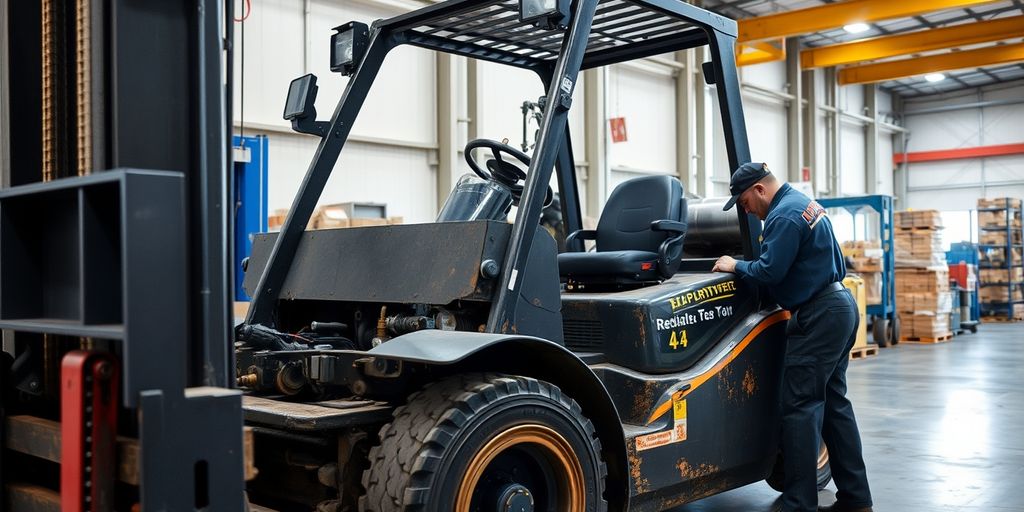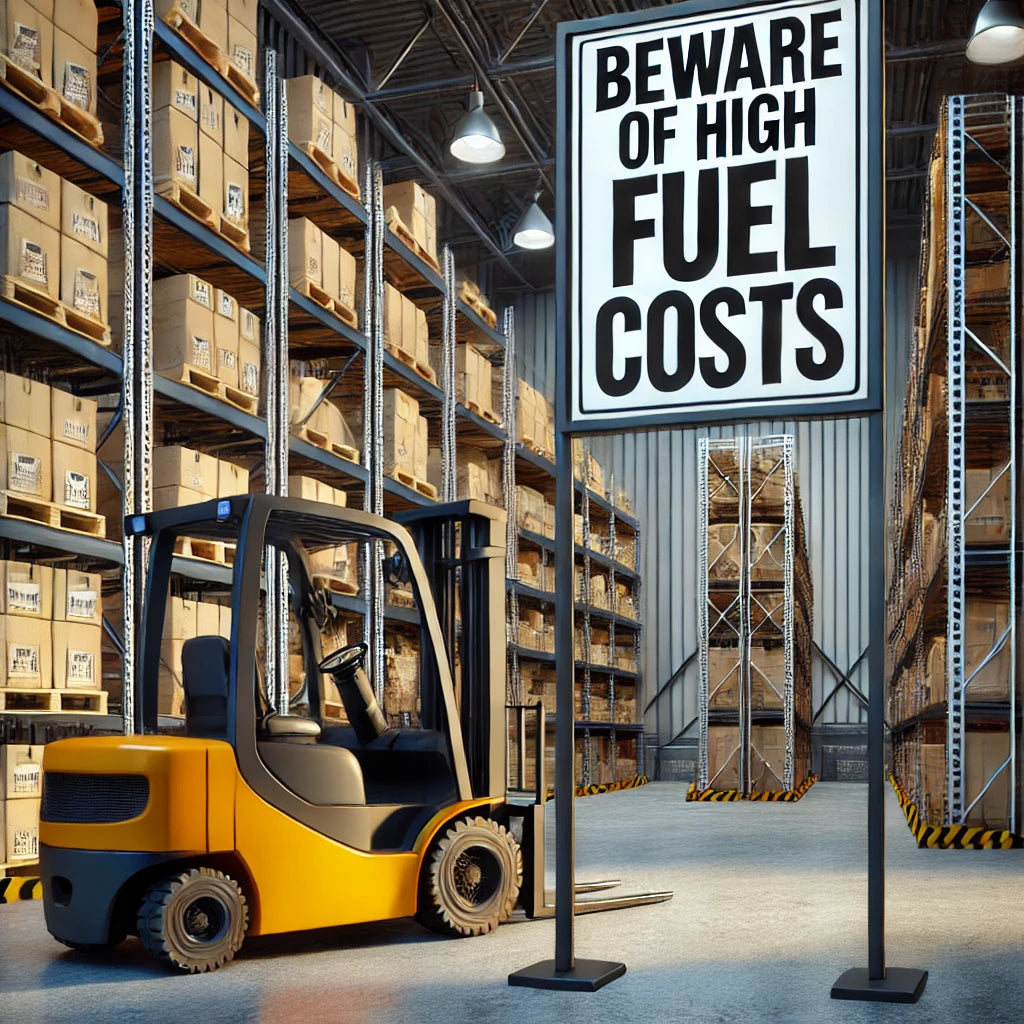Choosing the right forklift service company is a big decision for your business. The right partner can keep your forklifts running smoothly, saving you time and money. But with so many options out there, how do you know which one to pick? This guide will help you understand what to look for when selecting a forklift service provider.
Key Takeaways
- Identify your specific forklift needs, including load capacity and work environment.
- Research potential service providers by checking their reputation and service offerings.
- Understand the importance of maintenance and repair services for long-term performance.
- Consider training and safety programs to ensure compliance and operator safety.
- Evaluate the costs and benefits of different service agreements and customer support options.
Evaluating Your Specific Forklift Needs
Choosing the right forklift service company starts with understanding your specific forklift needs. This ensures you get the best service tailored to your operations. Here are the key areas to consider:
Understanding Load Capacity Requirements
First, determine the weight of your average load. This helps in selecting a forklift that can handle your materials efficiently. If you often move heavy items, you'll need a forklift with a higher load capacity.
Considering the Work Environment
Think about where you'll be using the forklift. Is it indoors, outdoors, or both? For indoor use, electric forklifts are quieter and produce fewer emissions. For outdoor or rough terrain, pneumatic tires are more suitable.
Determining Lift Height and Reach
Assess how high you need to lift your loads. Forklifts come with different lift heights, so choose one that meets your requirements. If your warehouse has tall shelves, ensure the forklift can reach the top safely.
Assessing Frequency of Use
Consider how often you'll use the forklift. For heavy daily use, you might need a more durable and reliable model. If usage is occasional, a less robust model might suffice.
By assessing your application needs, you'll be able to narrow down the choices and ultimately choose the right forklift for the job.
Researching Potential Forklift Service Providers
Checking Company Reputation and Reviews
When looking for a forklift service provider, start by checking their reputation. Look for reviews from current or past satisfied customers to build credibility and trust. Online reviews and testimonials can give you a good idea of what to expect.
Evaluating Service Offerings and Packages
Different companies offer various service packages. Make sure to compare what each provider includes in their packages. Some might offer routine maintenance, while others could provide emergency repair services. Knowing what you need will help you choose the right package.
Understanding Response Time and Availability
Response time is crucial when your forklift breaks down. Ask potential providers about their average response time and availability. A company that can respond quickly will minimize your downtime and keep your operations running smoothly.
Comparing Costs and Value
While cost is important, it shouldn't be the only factor. Compare the value you get for the price. Sometimes, paying a bit more for better service can save you money in the long run. Look at the overall value, including the quality of service and the expertise of the technicians.
Importance of Maintenance and Repair Services
Routine Maintenance Plans
Regular maintenance is essential for optimal forklift performance, extending its lifespan, and preventing unexpected breakdowns and costly repairs. Routine service and maintenance are crucial to the long-term performance and return on investment (ROI) of a forklift. A good maintenance plan should include scheduled inspections, lubrication, and replacement of worn-out parts.
Availability of Spare Parts
Having access to spare parts is vital to minimize downtime. Choose a service provider that ensures the availability of name-brand parts, both on-hand and delivered. This helps in achieving a high first-call fix rate and quick turnaround time.
Emergency Repair Services
In case of unexpected breakdowns, emergency repair services are crucial. A reliable service provider should offer prompt response times to get your forklift back in operation as quickly as possible. This reduces the cost of downtime and keeps your operations running smoothly.
Technician Expertise and Training
The expertise and training of technicians play a significant role in the quality of maintenance and repair services. Ensure that the service provider employs well-trained and experienced technicians who can handle complex issues and use advanced diagnostic tools effectively.
Choosing the right forklift service company involves evaluating their maintenance and repair services to ensure your equipment remains in top condition.
Training and Safety Considerations

OSHA Compliance and Certification
Ensuring that the forklift you hire complies with all relevant safety regulations and standards is crucial. The Occupational Safety & Health Administration (OSHA) has specific rules about forklift operator training and licensing. Operators must pass classroom training and a driving test before being licensed. They must also be over 18 years old and are required to be evaluated and recertified at least once every three years.
Operator Training Programs
Professional forklift dealers know those who invest in the least amount of forklift operator training end up paying the most in the long run. The availability of operator training is a big plus and should factor heavily into your decision on choosing a forklift. Many dealers provide training at their location if you only have a couple of operators. But for larger groups, they may be willing to train staff on-site at your facility.
Safety Features of Forklifts
High-quality, adjustable seating is important as forklift operators are sitting in their machines for hours at a time. Design and placement of controls are important as well. Investing in quality ergonomics will lessen the likelihood of injuries, such as back pain or carpal tunnel syndrome, which can be caused by repetitive tasks performed in uncomfortable seating and reaching conditions.
Ongoing Safety Audits and Refreshers
Routine service and maintenance are crucial to the long-term performance and return on investment (ROI) of a forklift. Regular safety audits and refresher courses ensure that operators stay updated on the latest safety protocols and practices. This not only helps in maintaining compliance but also in reducing the risk of accidents and injuries.
Technological Advancements in Forklift Services
Integration of Advanced Diagnostics
Modern forklifts now come with advanced diagnostic tools that help in identifying issues before they become major problems. These tools can monitor various parameters and provide real-time data to operators and service technicians, ensuring that the forklifts are always in optimal condition.
Use of Telematics for Fleet Management
Telematics systems are increasingly being used to manage forklift fleets. These systems provide detailed information on the usage, location, and performance of each forklift in the fleet. This data can be used to optimize routes, schedule maintenance, and improve overall efficiency.
Energy-Efficient Forklift Options
With the growing emphasis on sustainability, many companies are now opting for energy-efficient forklifts. These include electric forklifts powered by lithium-ion batteries and hydrogen fuel cells. These options not only reduce the carbon footprint but also offer lower operating costs in the long run.
Automation and Robotics in Forklift Operations
The integration of collaborative robots, or cobots, in forklift operations is a significant advancement. These autonomous forklifts can work alongside human operators, enhancing efficiency and safety in the workplace. Automation in forklift operations can lead to reduced labor costs and increased productivity.
Embracing these technological advancements can significantly improve the efficiency and safety of your forklift operations, making it easier to manage and maintain your fleet.
Cost Factors and Budgeting
Initial Purchase vs. Long-Term Costs
When deciding on a forklift, it's important to weigh the initial purchase cost against the long-term expenses. While buying a forklift might seem like a big investment, renting can sometimes be more affordable based on your needs. Consider the weight capacity of the forklift, as higher capacity forklifts will generally have higher rental rates.
Financing and Leasing Options
Forklifts can be expensive, so many businesses opt for financing or leasing. Leasing can be a good choice if you need to conserve operating capital. Rent and lease payments can be deducted from your taxes immediately, without the complexities of depreciation.
Cost of Downtime and Repairs
Operational costs, such as maintenance and fuel, should be planned for before purchasing. Downtime due to repairs can be costly, so it's crucial to ensure your forklift is easy to maintain and has readily available parts.
Evaluating Return on Investment (ROI)
Your forklift should last long enough to be worth the investment. Look at product specifications and read about others' experiences with the same model. This will help you determine if the forklift will provide a good return on investment.
Choosing the right forklift model for your needs is only part of the process. Ensure you maximize your uptime, minimize downtime, and get the maximum return on your investment.
Customer Support and Service Agreements

Understanding Service Level Agreements (SLAs)
When choosing a forklift service company, it's crucial to understand their Service Level Agreements (SLAs). SLAs outline the expected level of service and response times. They help ensure that you receive timely and efficient support when needed. Make sure to review these agreements carefully to avoid any misunderstandings.
Customer Support Availability
Reliable customer support is essential for minimizing downtime. Check if the service provider offers 24/7 support or if they have specific hours of operation. Knowing when and how you can reach them can save you a lot of trouble in the long run.
Customization of Service Contracts
Every business has unique needs, so it's important that the service contracts can be customized. Look for providers who offer flexible terms and can tailor their services to meet your specific requirements. This can include anything from routine maintenance to emergency repairs.
Post-Sale Support and Follow-Up
Good service doesn't end after the sale. Post-sale support and follow-up are critical for ensuring that your forklifts continue to operate efficiently. Regular check-ins and follow-up services can help identify potential issues before they become major problems.
Explore our comprehensive guide to forklift maintenance agreements to understand the differences between planned and full maintenance.
Conclusion
Choosing the right forklift service company is crucial for the smooth operation of your business. By considering factors such as the company's reputation, service offerings, response time, and the availability of parts, you can ensure that your forklifts remain in top condition. Remember, a reliable service provider not only helps in maintaining your equipment but also contributes to the overall efficiency and safety of your operations. Take your time to research and select a company that aligns with your specific needs and priorities. This careful selection will pay off in the long run, keeping your business running smoothly and efficiently.
Frequently Asked Questions
What factors should I consider when choosing a forklift service company?
You should look at your specific needs, the company's reputation, service offerings, response time, and costs.
Why is it important to evaluate the load capacity of forklifts?
Knowing the load capacity ensures the forklift can handle the weight of the materials you need to lift, preventing accidents and equipment damage.
How does the work environment affect forklift selection?
The work environment, such as indoor or outdoor settings and terrain type, determines the type of tires and fuel options suitable for the forklift.
What should I know about maintenance and repair services?
Check if the company offers routine maintenance plans, has spare parts available, provides emergency repair services, and employs trained technicians.
Why is operator training important?
Proper training ensures safety and compliance with OSHA regulations, reducing the risk of accidents and improving efficiency.
What are the benefits of advanced forklift technologies?
Advanced technologies like diagnostics, telematics, and automation improve efficiency, reduce downtime, and can offer energy-saving options.




Leave a comment
This site is protected by hCaptcha and the hCaptcha Privacy Policy and Terms of Service apply.